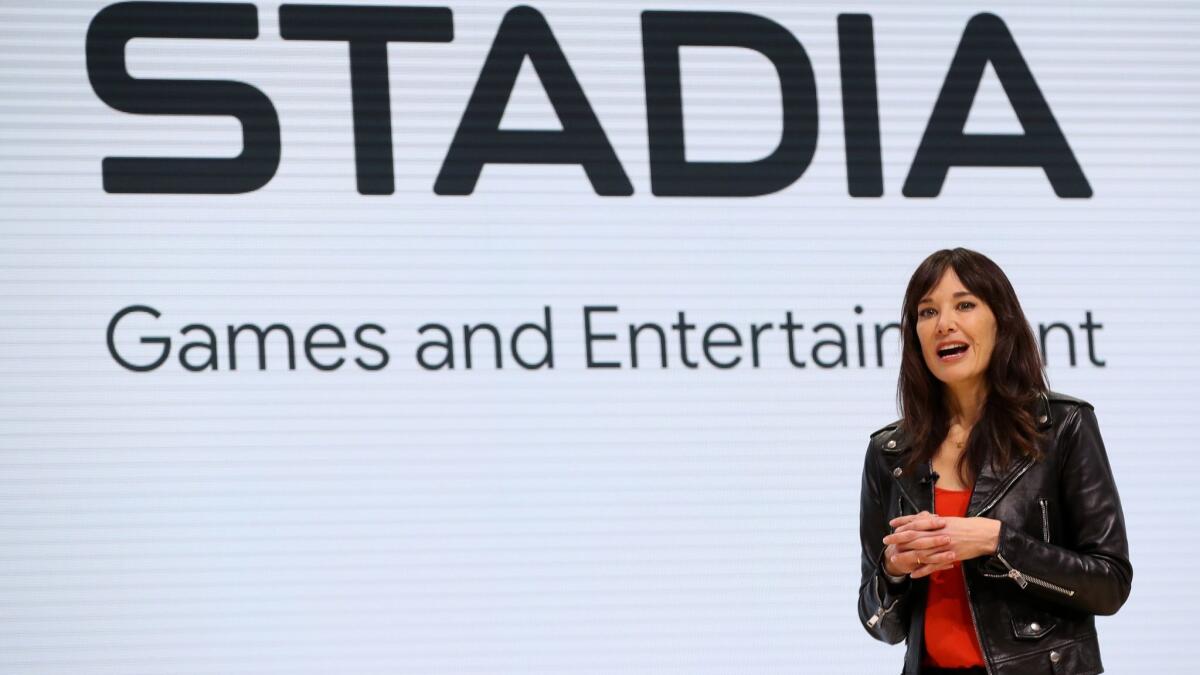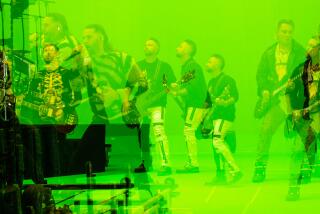Google’s Stadia imagines a post-console future for gaming

- Share via
At the Game Developers Conference in San Francisco this week, it was clear there was a new player in town.
Tech giant Google had taken over multiple spaces in and outside the Moscone Center, the convention hall where the annual industry-only gathering for interactive entertainment is held. The company even created a miniature game museum on Howard Street, leaving a spot open for its own future gaming achievements alongside historical high points such as the “Pokémon” titles and some early Atari experiments.
The fanfare heralded Google’s announcement Tuesday morning of a full-fledged jump into into the gaming industry via a platform it’s calling Stadia, a cloud-based, streaming platform that aims to hasten the end of the home console era.
The streaming of video games has long been a dream for developers, many of whom see pricey hardware as a barrier to entry that has kept games from dominating the cultural conversation the same way television or film can.
In introducing Stadia on the expansive main stage, Google Chief Executive Sundar Pichai said he wanted games to be as readily accessible as a hyperlink on the Internet. He described a platform that allows users to instantly enter big-budget, mass-market games by simply clicking a link on YouTube. A demo shown on a gargantuan screen showed a player hopscotching from a Google Chrome browser to a mobile phone to a television, accessing Stadia on the latter via a Chromecast digital media player. The enthusiastic audience cheered in response.
Google will act as a platform holder and developer.The company then introduced industry veteran and Ubisoft alumni Jade Raymond as the head of Stadia Games and Entertainment, who will not only work to bring developers to Stadia but craft first-party, console-exclusive titles for the company.
Google said Stadia will launch later in 2019, and the company targeted summer for a reveal of its initial games.
Raymond pledged to work with studios large and small. Those who partook in Google’s presentation included id Software — developer of first-person shooter game “Doom” — and Spain’s Tequila Works, which released the lush puzzle adventure “Rime.”
Among the Stadia innovations championed by Google will be the ability to join YouTube streamers in a game, or to allow such personalities to craft challenges for followers via what it’s calling “state share.” For instance, if a streamer encountered a particularly tricky section of a game, the YouTube personality could offer up that same section of the title for followers to try, aiming to further bridge the industry’s communal and interactive elements.
Google spent the bulk of the presentation aiming to dissuade any fears of streaming latency, even poking fun at competing consoles for requiring players to endure a lengthy download to play a new game. Stadia will run on top of Google’s data centers, and the company announced partnerships with popular game engines such as Unreal and Unity. The Linux-based platform will operate on a custom graphics card from processing firm AMD.
For multiplayer games, Google argued that Stadia could offer a more stable experience by controlling the game and its graphics and then simply streaming the title to users. Google vice president and general manager Phil Harrison said matches would not be dictated by “the client with the slowest or poorest internet connection,” and he predicted a future Stadia utopia where battle royale games such as “Fortnite” could “go from hundreds of players today to thousands of players of tomorrow.”
While Google will not be releasing a home console, the company will be crafting a Stadia-branded controller. Though it looks similar to other controllers on the market — and is not required to play games via Stadia — it offers some unique features, including an assistant button that could, in theory, detect where players are struggling and direct them to guidance on YouTube.
There’s still much to sort out, including how well Stadia will — or will not — interface with the top names in gaming today and if it will operate as a subscription service or storefront. Will Stadia be a more closed, curated environment or license as broadly as Spotify? As for Stadia’s catalog, will it be robust and work well with individuals’ internet connections?
And the most crucial question remains: Will non-gamers experiment with playing via a Chrome browser or invest in a Chromecast?
Throughout GDC — where there are games dealing with everything from the excitement of a new love to struggles with body image — developers are grappling with how to get nontraditional games (read: those that don’t involve killing something) into the hands of those who don’t consider themselves gamers.
To eliminate, in the words of Harrison, “that friction” that comes with pricey hardware investments, games in theory would find a new audience.
Earlier at GDC, while presenting a game about sleep paralysis, “The Relief of Impact,” Priscilla Snow noted this challenge. “There is a gap,” said Snow. “I would love to see all the small and more personal games available to a wider audience,” adding that those not already in tune with the game community simply do not know where “to find, buy or play games.”
It’s why companies such as Microsoft, Sony and Valve’s Steam have invested or experimented with their own subscription, streaming or cloud-based platforms, but the so-called “Netflix-for-games” — a future where the hardware with which we play games on is essentially rendered irrelevant — has thus far remained elusive.
That’s part of Stadia’s pitch.
“The power of instant access,” said Harrison, “has already transformed the music and movie industries.”
Follow me on Twitter: @toddmartens
More to Read
The biggest entertainment stories
Get our big stories about Hollywood, film, television, music, arts, culture and more right in your inbox as soon as they publish.
You may occasionally receive promotional content from the Los Angeles Times.











